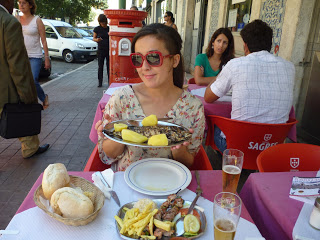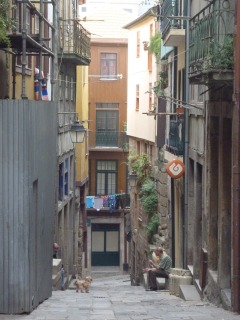My blog entries are getting progressively more retrospective, but I prefer it because I’m learning such huge life lessons that it’s better to let things settle before writing about them.
So my last entry was written in the dorm of a beautiful hostel in Lisbon. I had wanted to visit Portugal for years and it definitely didn’t disappoint. As usual I did next to no research for the trip and just took it as it came… I knew to expect beautiful countryside, Middle Eastern architectural influences and delicious seafood. I learnt slightly more when I started gathering information about the Camino Portugués (the big pilgrim hike I mentioned early on), but that was more concerning the specifics of how to get from one place to the next rather than how Portugal works as a country or what its history is. Maybe that’s the wrong way to approach travel, but it has always worked for me and I like learning through experience and by making little mistakes. As soon as I arrive in a country I smile widely, try to use whatever phrases I know and generally make an effort to speak the language.
My friend El and I transferred our heavy drinking and partying-until-6am ways straight from London to Lisbon. We were staying in the middle of Bairro Altos (literally ‘high ground’); one of the party zones of Lisbon wherein an entire city block of narrow streets turns into an orgy of street life every night. Somehow we managed to choose a hostel that was staffed entirely by attractive, single Portuguese men. Again, whilst being as discrete as possible, I will mention that I enjoyed being unattached in Lisbon. When the day came to pack our tiny 30 litre backpacks for two weeks’ worth of hiking, navigate our way through the city in 30 degree heat to the airport to drop our suitcases at Left Luggage, find our way to the bus station to catch our ride to Porto then walk up hill and down dale to find our new hostel, we had both clocked up around an hour of sleep. I managed to have a snooze on the bus, but awoke after a couple of hours to find El with her fingers in her ears and fury on her face. The source: an elderly Portuguese man in the seat in front of us who honestly did not stop maniacally talking for the next hour. He seemed to be loosely directing his diatribe towards the bus driver, who was determinedly ignoring him. He was earning pissed off looks from the passengers in the surrounding seats, however words honestly did not stop tumbling from his mouth. El was getting particularly enraged by this… meanwhile I was finding our chatty friend and El’s reaction somewhat hilarious. When I suggested that she listen to some music to drown out the noise pollution, it was revealed that we had both left our earphones in Lisbon due to our shambolic departure. Goodbye $150 Sennheisers and hello cosmic slap on the wrist. We christened this day ‘Sweating and Regretting’.
We enjoyed our night in Porto, staying in another beautiful hostel and hungrily eating yet another amazing meal. We learnt that it was far more economical to share as the servings were inevitably huge (even the ‘half’ portions), and there were always the baskets of bread with butter, cheese and paté that would appear prior to the mains arriving. During our first week in Portugal we were under the mistaken impression that this was all free… ‘The Portuguese culture is so generous!’ we drunkenly cried. It wasn’t until a waiter explained BEFORE we ate an entire basket of bread and all the toppings that they charge for what is eaten. Again, a mistake that wouldn’t have been made if we had consulted a Lonely Planet… but how happy were we when we thought we were eating free cheese?
The next hundred or so paragraphs will be arranged according to the days of the Camino de Santiago. Common guidebooks used by English speakers are the ones written by John Brierley, that you can purchase online and which go into detail about the history of every small landmark along the Way as well as providing clear graphs outlining the inclines you will experience etc. Generally people will join a confraternity such as The Confraternity of St James and then arrange to buy a Pilgrim Passport (credencial), through them months in advance. I had left it too late to buy the guide online, and found it too expensive to join a Confraternity… so I joined an online forum, got directed to these free online guides, then rocked up to a beautiful church in Lisbon to be told that they had run out of credencials but there was a number that I could call to get some. You use your credencial to gain access to the albergues (pilgrim-specific dorm accommodation along the Way… some donation based but most at a flat rate of 5 euros per night), and to collect your sellos (stamps) at accommodation or restaurants etc. When you reach the Compostela in Santiago you show them your credencial with all the evidence that you’ve walked at least 100kms and you receive a certificate. In the late afternoon, after a sun-soaked and languid day at the beach, I had met with two absolutely lovely people from a group called Via Lusitana who sold me two passports for 3 Euros. They also gave me a shell badge (a symbol of the pilgrim), and a mobile number to call if I needed anything whatsoever. I had then merrily skipped off to be shown around the castle by one of the guys from the hostel. Good day.
Anyway…
Day 1 – Porto to Vilar Do Pinheiro
So, we started our hike from the Cathedral in Porto … at 10am… probably around 4 hours after the recommended time. We used our city maps to get us there and then located our first yellow arrow (waymarking). As we followed that arrow down a narrow laneway we found the next one… and the next one… scouring the surfaces of every building to spy some hovering above our heads and some scrawled across crumbling curbs. We shared a sense of excitement and achievement that made us believe that we could actually do this! The process was very similar to the orienteering activities we did in school…. which made it awkward when we realised that neither of us were ever any good at orienteering. We put that thought aside and forged ahead. There were 18kms on the cards that day, half of which required us to navigate our way through ancient city streets that were confusing and steep as they were beautiful and inspiring. The other half consisted of walking along the busy, straight main road out of Porto in the full glare of the mid-day sun. Many pilgrims skip this part of the camino, catching a bus and joining later to avoid this somewhat dry and depressing light industrial zone. I was starting to think that maybe they had the right idea, but then El turned to me and said “We just walked out of a major city… I don’t think I’ve ever done that before”. We looked backwards at the skyline of Porto, then at each other and smiled.
So, we started our hike from the Cathedral in Porto … at 10am… probably around 4 hours after the recommended time. We used our city maps to get us there and then located our first yellow arrow (waymarking). As we followed that arrow down a narrow laneway we found the next one… and the next one… scouring the surfaces of every building to spy some hovering above our heads and some scrawled across crumbling curbs. We shared a sense of excitement and achievement that made us believe that we could actually do this! The process was very similar to the orienteering activities we did in school…. which made it awkward when we realised that neither of us were ever any good at orienteering. We put that thought aside and forged ahead. There were 18kms on the cards that day, half of which required us to navigate our way through ancient city streets that were confusing and steep as they were beautiful and inspiring. The other half consisted of walking along the busy, straight main road out of Porto in the full glare of the mid-day sun. Many pilgrims skip this part of the camino, catching a bus and joining later to avoid this somewhat dry and depressing light industrial zone. I was starting to think that maybe they had the right idea, but then El turned to me and said “We just walked out of a major city… I don’t think I’ve ever done that before”. We looked backwards at the skyline of Porto, then at each other and smiled.
We did get to some pretty countryside and winding country lanes towards the end of the day although by that point our unfit bodies were protesting, so we probably didn’t appreciate it. The arches of my feet were especially painful despite the custom beds I’d had made for my hiking boots in New Zealand when I’d had money. There was also the stress of not knowing exactly how many kilometres we had walked because we just didn’t have a concept of how long each one took (and remember our guides were very minimal)! We really didn’t want to screw up and not find our accommodation the very first day. As it was, we found our pension (no albergue in this village), and paid quite a hefty sum for a private twin room.
We hobbled around, washed our clothes in the sink and laughed ‘til we cried about so many things that night. I realised just how discombobulated I had been whilst packing; El had brought along a strapless silk maxi dress to lounge around in when not hiking, whereas I had brought nothing of the sort and just had a whole bunch of overly practical clothes. Some of the darker things that had been bothering me for the previous months also came out for discussion… namely the body image issues I’d been dealing with. This was to be a recurring theme throughout the hike and I don’t think either of us knew how significant it had been until then.





